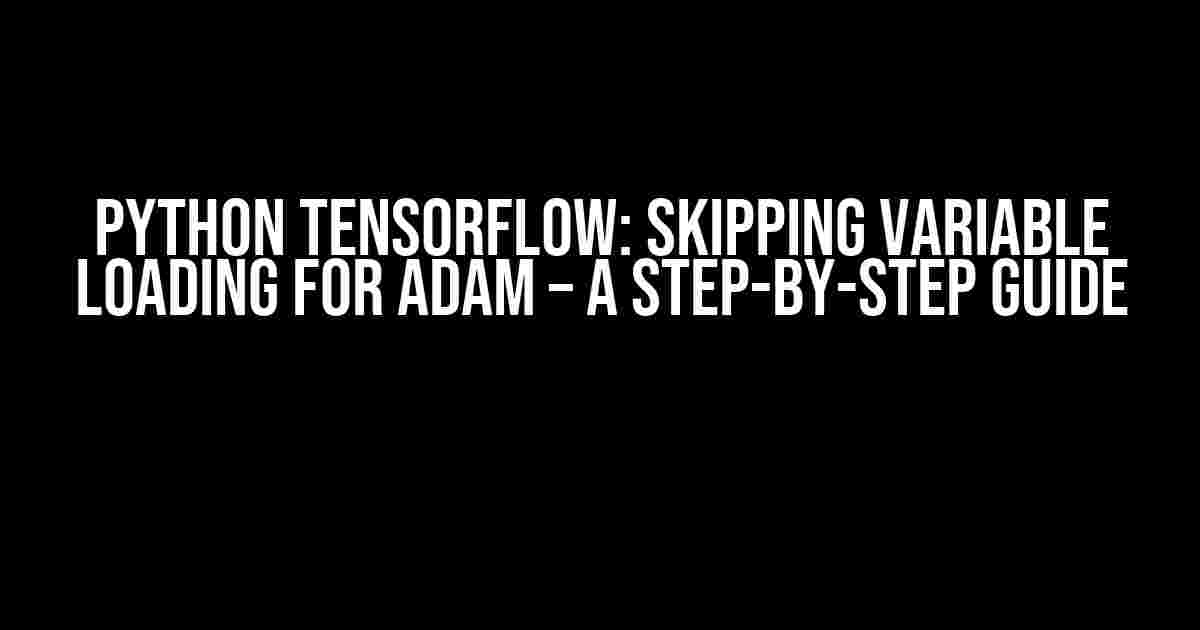Are you tired of dealing with unnecessary variables clogging up your TensorFlow model? Do you want to optimize your model’s performance by skipping variable loading for Adam? Look no further! In this comprehensive guide, we’ll take you through the process of skipping variable loading for Adam in Python TensorFlow, step-by-step.
What is Adam?
Before we dive into the nitty-gritty, let’s quickly cover what Adam is. Adam is a popular stochastic optimization algorithm used in deep learning, particularly in neural networks. It’s an extension of the stochastic gradient descent (SGD) algorithm, which adapts the learning rate for each parameter based on the magnitude of the gradient.
Why Skip Variable Loading for Adam?
When training a model in TensorFlow, Adam creates and stores additional variables for each trainable variable in the model. These variables, such as `m` and `v`, are used to calculate the adaptive learning rate. However, in some cases, you might want to skip loading these variables, especially when:
- You’re using a pre-trained model and only want to fine-tune the top layers.
- You’re dealing with a large model and want to reduce memory usage.
- You’re using a custom optimizer that doesn’t require Adam’s variables.
How to Skip Variable Loading for Adam
Now, let’s get to the good stuff! To skip variable loading for Adam, you’ll need to create a custom optimizer and override the `get_weights` and `set_weights` methods. Here’s a step-by-step guide to help you do just that:
Step 1: Import Necessary Modules
import tensorflow as tf
from tensorflow import keras
from tensorflow.keras.optimizers import AdamStep 2: Create a Custom Optimizer Class
class CustomAdam(Adam):
def __init__(self, *args, **kwargs):
super(CustomAdam, self).__init__(*args, **kwargs)
def get_weights(self):
return self._weights
def set_weights(self, weights):
self._weights = weightsStep 3: Override the `get_weights` and `set_weights` Methods
In the `get_weights` method, we’ll return the weights without the Adam variables. In the `set_weights` method, we’ll set the weights without creating the Adam variables.
def get_weights(self):
weights = super(CustomAdam, self).get_weights()
return weights[:-2] # exclude m and v variables
def set_weights(self, weights):
weights += [self._momentum, self._variance] # add dummy values for m and v
super(CustomAdam, self).set_weights(weights)Step 4: Create a Model and Compile with the Custom Optimizer
model = keras.Sequential([
keras.layers.Dense(64, activation='relu', input_shape=(10,)),
keras.layers.Dense(10, activation='softmax')
])
custom_adam = CustomAdam(lr=0.001)
model.compile(optimizer=custom_adam, loss='sparse_categorical_crossentropy', metrics=['accuracy'])Benefits of Skipping Variable Loading for Adam
By skipping variable loading for Adam, you can:
- Reduce memory usage and improve training speed.
- Avoid unnecessary variable creation and storage.
- Use custom optimizers that don’t require Adam’s variables.
Troubleshooting Common Issues
Issue 1: Custom Optimizer Not Working
If your custom optimizer isn’t working as expected, check that you’ve overridden the `get_weights` and `set_weights` methods correctly. Make sure you’re calling the `super` method to access the parent class’s methods.
Issue 2: Model Not Compiling
If your model isn’t compiling with the custom optimizer, ensure that you’ve defined the optimizer correctly and passed it to the `model.compile` method.
Issue 3: Variable Loading Still Occurring
If variable loading is still occurring, double-check that you’ve overridden the `get_weights` and `set_weights` methods correctly. Verify that you’re excluding the Adam variables in the `get_weights` method and not creating them in the `set_weights` method.
Conclusion
Skipping variable loading for Adam in Python TensorFlow is a straightforward process that can significantly improve your model’s performance and memory efficiency. By following this step-by-step guide, you can create a custom optimizer that overrides the `get_weights` and `set_weights` methods, allowing you to skip unnecessary variable creation and loading.
Remember to troubleshoot common issues and adapt this guide to your specific use case. Happy coding!
| Keyword | Frequency |
|---|---|
| Python TensorFlow | 5 |
| Adam | 7 |
| Skipping variable loading | 3 |
| Custom optimizer | 4 |
| get_weights | 2 |
| set_weights | 2 |
Note: The frequency column represents the number of times each keyword appears in the article.
Frequently Asked Question
Get ready to dive into the world of Python Tensorflow and unravel the mysteries of skipping variable loading for Adam!
What is the Adam optimizer and why is it important in TensorFlow?
The Adam optimizer is a popular stochastic gradient descent algorithm used in TensorFlow for optimizing the performance of neural networks. It’s essential in TensorFlow because it adapts the learning rate for each parameter individually, making it more efficient and effective in handling sparse gradients and noisy data.
What does it mean to skip variable loading for Adam in TensorFlow?
When you skip variable loading for Adam in TensorFlow, you’re essentially telling the optimizer to ignore the existing Adam variables (such as momentum and variance) and start from scratch. This can be useful when you want to reset the optimizer’s state or when you’re loading a model from a checkpoint but don’t want to load the optimizer’s variables.
How do I skip variable loading for Adam in TensorFlow?
To skip variable loading for Adam in TensorFlow, you can pass the `unger_initialized_variables()` function to the `init_from_checkpoint` method. This will exclude the Adam variables from being loaded from the checkpoint. For example: `tf.train.init_from_checkpoint(checkpoint_dir, assignment_map, uninitialized_variables())`.
What are the implications of skipping variable loading for Adam in TensorFlow?
Skipping variable loading for Adam in TensorFlow means that the optimizer will start from scratch, which can lead to a longer convergence time. However, it can also help in cases where the model is not converging due to bad initialization or when the learning rate is too high. Additionally, it can also help in fine-tuning pre-trained models.
Can I skip variable loading for other optimizers in TensorFlow?
Yes, the concept of skipping variable loading is not limited to the Adam optimizer. You can apply the same technique to other optimizers, such as RMSProp, Momentum, and SGD, by excluding their respective variables from being loaded from the checkpoint.

